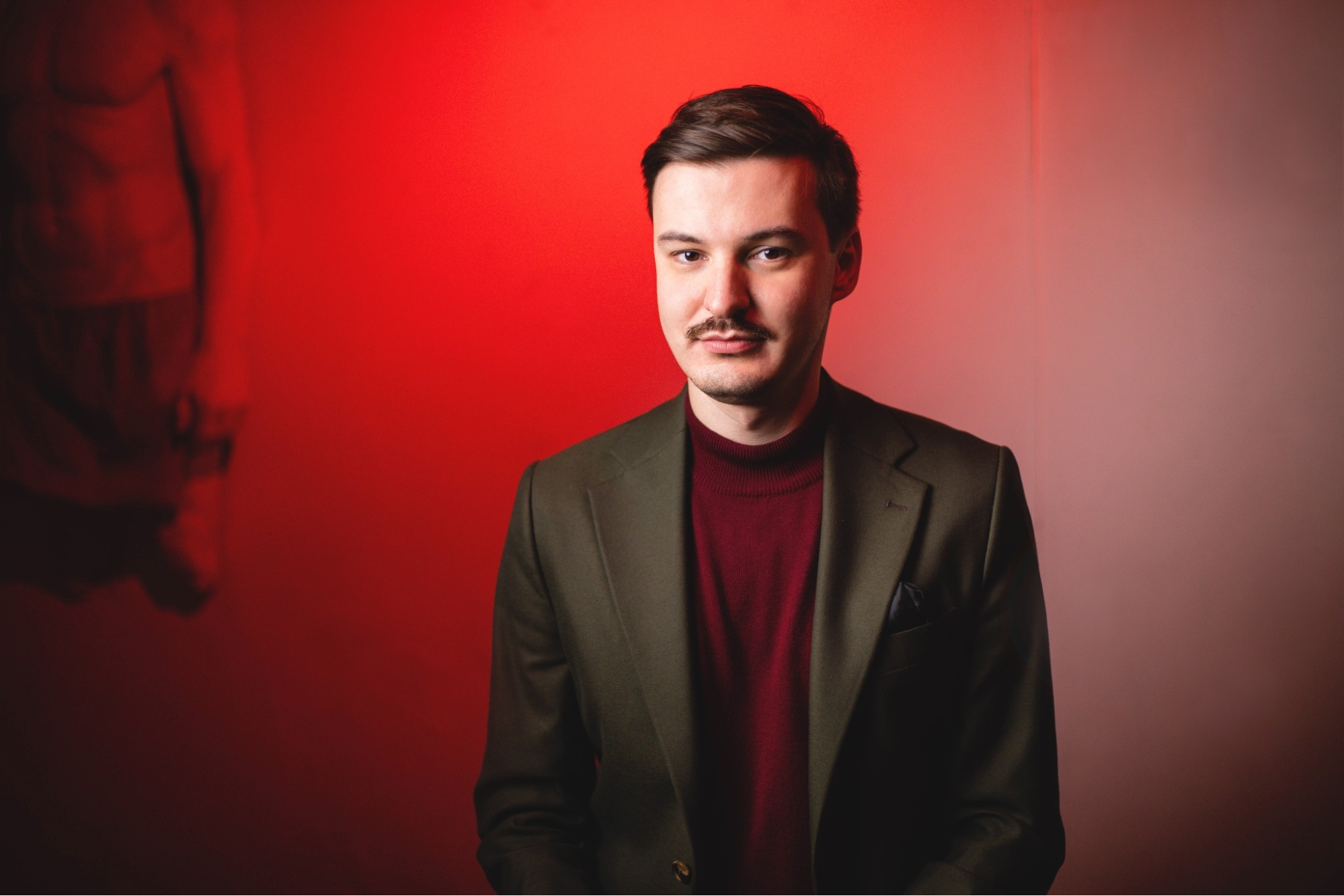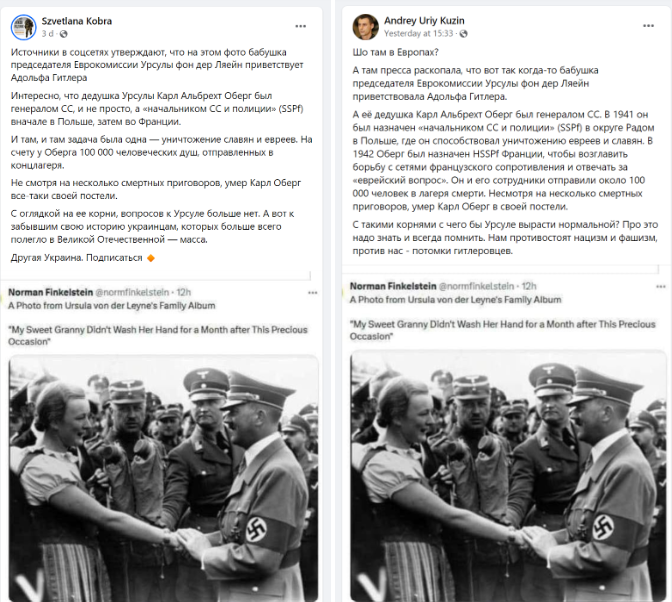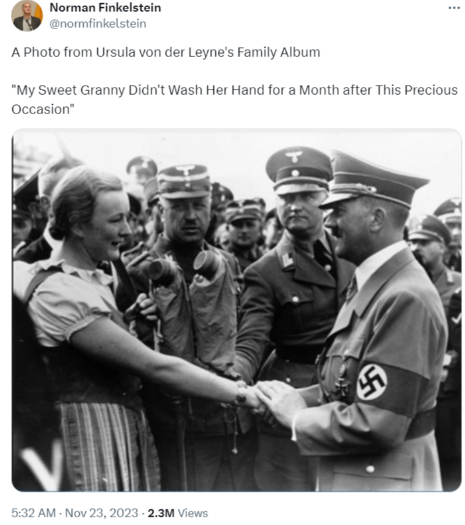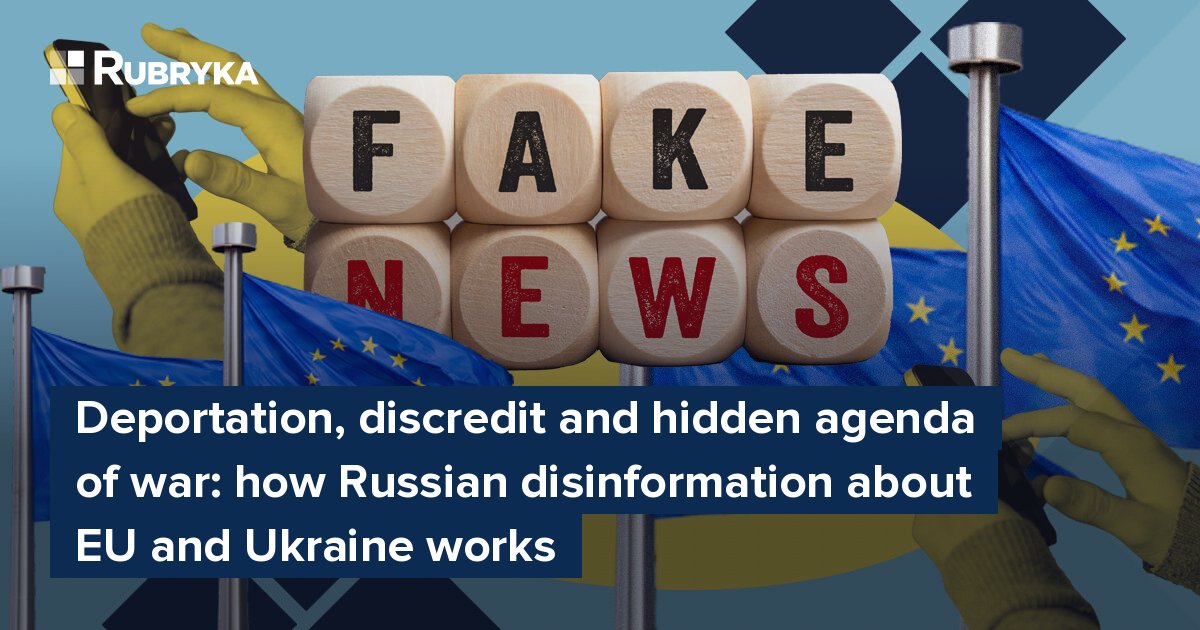
What is the problem?
After the start of the full-scale invasion, Ukraine's European integration has accelerated significantly. The Russians see this as a threat and are trying to counter it using disinformation, among other tools. They constantly litter information space, throwing in fakes about Ukraine and the EU.
Usually, these fakes are quite absurd and sound like nonsense, but Russian propaganda works not on quality but on quantity. Its main task is not to force people to believe in one deception but to clutter up a person's information space, trying to confuse them.
"When someone hears the same thing ten times in different contexts, even refuted, it still settles somewhere in the back of a person's mind," explains Vadym Miskyi.

Vadym Miskyi, program director of Detector Media. Photo: Facebook page of Vadym Myskyi
Another problem is that debunking must catch up with the fake. Moreover, fakes are usually seen by many more people than debunking, since they are dryer analytical material. Debunking doesn't spread as quickly as emotional headlines about Ukrainians who allegedly burned down a house in Germany.
What is the solution?
It is necessary to fight against each individual fake, but working with the narratives of Russian propaganda proves to be much more efficient. This term refers to a collection of fakes linked by a common topic. To counter it, one must understand these narratives and know their counterarguments.
"It is necessary to use the example of specific fakes to talk about the narrative itself, in which they are embedded," Miskyi is convinced. The specialist explains that, then, looking for countertheses to the narrative itself is much more effective. This way, a person will understand what to expect from Russian propaganda and be prepared for it.
How does it work?
The main goal of Russian disinformation on this topic is to demonize the European Union and convince Ukrainians that it only poses a threat to their country. The Russians packaged this message, for example, in the following narratives:
- Europeans are tired of Ukrainian refugees and want to return them home
- EU leaders support Ukraine because of their Nazi views
- the reasons for the war in Ukraine are the aggressive desires of the Americans and Europeans, not the Russians
The list is not exhaustive. Rubryka refutes Russian propaganda narratives and debunks the myths using specific fakes as an example.
"Deportation of 830,000 Ukrainians" by April 15
In March, a screenshot allegedly from the website of the Representation of the European Union in Ukraine appeared on social media, which referred to the deportation of 830,000 Ukrainians. The Council of Europe seems to have made such a decision due to mass protests by Ukrainians across Europe.
"Yesterday, the Council of the EU decided to continue restrictive measures against persons arriving from Ukraine for temporary stay. 830,000 Ukrainians will be deported from the territory of the EU by April 15, 2024," the message reads.
Today, we can already see that it was a fake, perhaps because it is already May outside, and no one has deported Ukrainians. The fact checkers of the VoxCheck project dealt with it even earlier — they discovered this was a screenshot from an actual website on which Russians replaced the original text with their own. This conclusion was made because the news headline did not match what can be seen at the top of the screenshot.
The text of the real news was that the Council of Europe extended personal sanctions for violating the territorial integrity of Ukraine and began with the words: "Russia's war of aggression against Ukraine." Spelling errors and misused Ukrainian words also indicated that the message was fake.
The Telegram bot @EEAS_deportation_bot, allegedly belonging to the European External Affairs Service (EEAS), also turned out to be fake.
A counterargument to the narrative about the deportation of Ukrainians from the EU
From March 4, 2022, temporary protection for people fleeing Russia's war against Ukraine has been in effect on the territory of the EU. It provides immediate and collective protection for Ukrainian displaced people and ensures rights to residence, education, access to the labor market, and social and medical assistance in the EU.
On October 19, 2023, the EU Council officially extended this mechanism until March 4, 2025. Then Fernando Grande-Marlasca Gómez, acting Minister of the Interior of Spain, which then chaired the EU Council, said that the EU would continue to support Ukrainian refugees.
"The EU will support the Ukrainian people as long as necessary. The extension of the protection status gives certainty to more than 4 million refugees who have found a safe haven in the EU," he said.
Ursula von der Leyen's grandmother "in Hitler's arms"
At the end of March, several Russian-language accounts published a photo of Adolf Hitler shaking hands with an unknown woman. According to the text of these posts, it was the grandmother of the president of the European Commission, Ursula von der Leyen. Her alleged grandfather, Karl Albrecht Oberg, was the head of the SS and sent 100,000 people to concentration camps.
"Sources on social media claim that in this photo, the grandmother of the head of the European Commission, Ursula von der Leyen, greets Adolf Hitler. Interestingly, Ursula's grandfather Karl Albrecht Oberg was an SS general, and not just one, but the "chief of the SS and police" (SSPf) first in Poland, then in France," Svetlana Kobra wrote in her post.

Screenshots of posts about the alleged roots of Ursula von der Leyen. Photo: MythDetector
Experts of the Georgian MythDetector project refuted this fake. They found out who people were referring to in their posts. This was the statement of the American political scientist and history researcher Norman Finkelstein. He posted this tweet in November 2023 as a joke.
"A photo from Ursula von der Leyen's family album: 'My sweet grandma didn't wash her hands for a month after this precious event,'" the humorous post read.

Screenshot of Norman Finkelstein's humorous tweet about Ursula von der Leyen's roots. Photo: MythDetector
Georgian fact-checkers then noted that it was impossible to confirm the identity of the woman in the photo using open sources. The only information they found was that this photo was taken in 1937 in the city of Bückeburg, showing Hitler shaking hands with a "traditionally dressed peasant girl," as described by the American photo agency Getty Images.
The information about the grandfather of the President of the European Commission is also false. Her grandfather's real name was Karl Eduard Albrecht, a doctor and psychologist. It is possible to assume that the posts referred to Ursula von der Leyen's great-grandfather, but his name was Friedrich Karl Albrecht, not the Karl Albrecht Oberg mentioned in the posts. Ursula von der Leyen's great-grandfather was an ordinary merchant. Karl Albrecht Oberg, who was indeed an SS general and was responsible for the deportation of 75,000 Jews from France alone, has no relation to the current president of the European Commission.
A counterargument to attempts to discredit EU leaders
Ursula von der Leyen is one of Ukraine's greatest friends in Europe. She supports the Ukrainian people in their struggle for independence. Since the beginning of the full-scale invasion, she has come to Ukraine several times and witnessed the horrors of Russia's war crimes.
"I'm in Kyiv to mark the anniversary of the second year of Russia's war against Ukraine and to honor the extraordinary resilience of the Ukrainian people. More than ever, we firmly stand by Ukraine—financially, economically, militarily, morally—until the country becomes finally free," wrote the president of the European Commission, visiting Ukraine on the second anniversary of the invasion.
She put a lot of effort into ensuring the European Council allocated a €50 billion aid package to Ukraine when Hungary blocked such a decision at the end of 2023. This money was extremely important at the time against the backdrop of the delay in financial aid from the United States.
"We have mobilized our budget to provide financial support, but now we are approaching the limits of our budget to meet these challenges. Therefore, in June, the European Commission proposed strengthening the bloc's budget. We set very clear priorities. Of course, the first priority is Ukraine, supporting Ukraine," said Ursula von der Leyen in December 2023.
The EU "wants" Ukrainian minerals, that's why it "started" this war
At the beginning of the year, several Russian mass media spread information that Germany was planning to seize the Donbas for the sake of the region's minerals. They drew such conclusions from an interview with MP Roderich Kiesewetter.
"It is very difficult to get rid of the feeling of historical déjà vu. Hitler reasoned in a similar way when he justified the capture of Stalingrad by the need to deprive the USSR of Baku oil," wrote one of the Russian media outlets.
The StopFake project refuted this fake. According to them, the Russian mass media manipulated information from the part of the interview taken out of context by the ARD TV channel. A member of the German parliament spoke about the causes and consequences of Russia's aggression.
In an interview, the German MP noted that the Ukrainian economy is necessary to provide the world market with certain goods. He explained that the consequence of the full-scale invasion was a global crisis in the food market. Russia's actions have increased the risk of famine in the world's poorest countries.
Next, Roderich Kiesewetter started talking about European energy and noted that Europe needed its own lithium deposits, which existed in the Donetsk and Luhansk regions occupied by Russia since 2014. Having seized the largest deposits in the region, Russia took the EU into an energy blockade.
"Raw materials in Donetsk and Luhansk regions are another interest and goal of Russia in this war of aggression, and this explains why [Russian] slogans like "land for peace" are completely unrealistic. Ukraine must be able to survive economically as a country, including the Donetsk-Luhansk region, as well as the ports on the Black Sea, which are necessary for the export of grain. That is why Crimea has not only a symbolic meaning but also ensures the economic viability of Ukraine in the future," explained Kiesewetter after Russian disinformation began to spread.
A counterargument to the narrative about the "real" causes of war
In fact, the European Union provides unprecedented military, humanitarian, and financial support to Ukraine so that it can fight for its own independence. Thus, EU countries collectively provided $93.3 billion in aid. Germany, Denmark, and Poland are among the leaders in terms of support.
This figure does not consider aid provided by EU member states outside the union. For example, Lithuania, Latvia, and Estonia allocate more than 1% of their GDP to support Ukraine. Thanks to this support, Ukraine can lead resistance and implement social policy.
Here, you can read more about the refutation of Russian fakes about Ukraine and its partners and how to recognize and check a fake.
Newsletter
Digest of the most interesting news: just about the main thing









